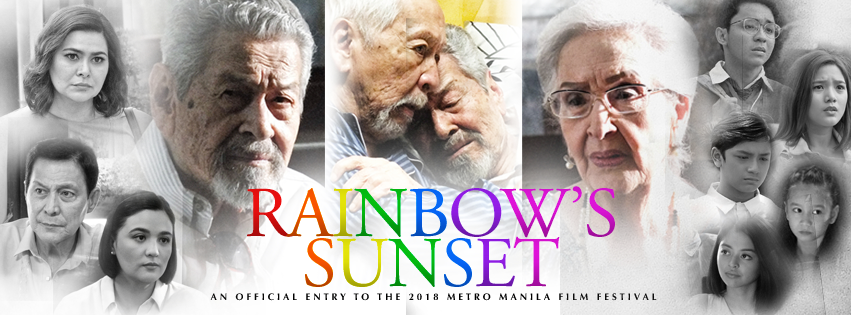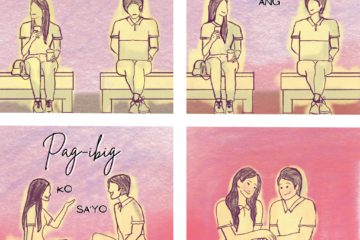By IAN JOZEL N. JEREZ

“THE CLOSET” serves as a social space for queers who live in fear of condemnation by people around them and by society at large, for they are perceived as individuals who do not conform and adhere to gender norms. These individuals are even branded by superior defaults as abhorrent and abnormal when they subject them to scrutiny, to the point where others believe that being queer has a cure.
Under the direction of Joel Lamangan, Rainbow’s Sunset is an entry to this year’s Metro Manila Film Festival. The film revolves around the story of Ramon (Eddie Garcia) and Fredo (Tony Mabesa) and their struggles as male homosexuals who are on the brink of death. After learning of Fredo’s illness, Ramon comes out to his family as a gay man and tells them he intends to live with Fredo until his expected demise.
The narrative of the film is told from the perspective of Ramon’s wife, Sylvia (Gloria Romero), as the film also uncovers the struggles of their children after the town hears of Ramon’s homosexual relationship with Fredo. This portrayal of the family in the film may be considered as a typical representation headed by a patriarch. Ramon’s children are faced with the reality that their father is gay: the characters of Georgina and Emman continuously disregard their father’s homosexuality, while Marife strongly supports her father regardless of his sexual orientation.
Ramon is not a father who strongly displays violent masculine behavior. He is different in every aspect of what people expect from a father. Inasmuch as Ramon loves his children and his wife, he is caged within his heterosexual impulses, thereby fleshing out as a queer elderly man whose closet must be left behind. This closet that Ramon departs from symbolizes his repressed homosexual tendencies as he finally embraces his true identity.
The film discusses the process of coming out of the closet but falters in the execution of its plot as it is predictable and barely supported by elements of foreshadowing. The screenplay written by Eric Ramos creates a tangled and convoluted atmosphere throughout the film as the narrative simply continues from one plot to another and unnecessarily includes another storyline. This is also evidently seen from how the editing is carried out.
In other words, there are numerous subplots that do not logically cohere with the principal plot. It is understood that this form of narrative is executed in order to pave way for the stories of Ramon and Sylvia’s children, but it could have been better if the film simply focused its lens on Ramon, Fredo, and Sylvia, since they are the central characters in the film.
On the other hand, Rainbow’s Sunset also succeeds in addressing the notion of homosexuality as a phase in one’s life by giving it a different meaning: in truth, it is not merely a phase as portrayed by Ramon and Fredo, who have been lovers since their youth. This strong bond between them creates a perfect duo between elderly queer lovers. This form of representation in LGBT films is rarely seen by viewers, particularly the Filipino audience.
It is given that there are other Filipinos who still perceive homosexuality as an inferior branch of human sexuality that needs to be cured. Rainbow’s Sunset advocates against discrimination of the LGBT community by addressing the realities of gay oppression and showing its viewers that there is nothing wrong with being gay, that loving one of the same-sex does not need any form of medication, and that being a non-heterosexual individual must not be interpreted as inferiority. Indeed, there has always been a force that runs beyond the dimensions of heterosexuality, and this goes over the domains of the rainbow.
The direction of Lamangan and the performances of Garcia, Mabesa, and Romero create a dynamic and heart-rending ensemble in spite of a poor screenplay, as Rainbow’s Sunset proves that love is an impregnable force which always has the power to conquer hatred. It also provides the implication that not everyone belongs to a heterosexual paradigm, for there are others who classify themselves as proudly and visibly queer. F



